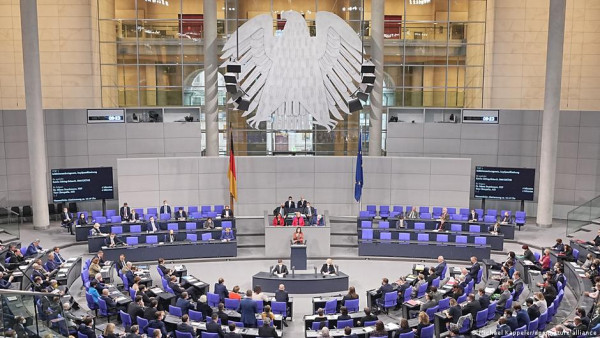"At the moment, any relaxation is not justified," Health Minister and Professor of Epidemiology Karl Lauterbach said last Tuesday. "Scientific evidence allows for a first step towards opening up," Chancellor Olaf Solz said yesterday, with pressure from the states waiting to lift the restrictions. Combined with the opposition's "rebellion" over mandatory health care vaccinations and the reservations of the ruling Liberals (FDP), pandemic management is evolving into an extremely complex challenge.
The cases are at an extremely high level
The fact that coronavirus cases remain at an extremely high level does not seem to discourage some state governments from opening up social life and markets, even before the prime ministers' meeting with the chancellor scheduled for February 16. Indicatively, the Mayor / Governor of Berlin, Francesca Giffay, announced that from February 18 in the state, the 2G Rule (access only to vaccinated and sick) for the entry of "non-essential" stores will be abolished.
The same decision was made by the neighboring state of Brandenburg. Customers of the stores will, however, be required to use FFP-2 type masks. Respectively, Baden-Württemberg abolished the 3G Rule (access to vaccinated / sick and those who test negative) the day before yesterday, while Bavaria, the state with the highest incidence rate in Germany, abolished the working hours limit. Similar decisions were made by Bremen, Hesse and Mecklenburg-Pomerania, followed by Hamburg and Saxony, which will convert the 2G to 3G Rule. By contrast, North Rhine-Westphalia and Saxony-Anhalt intend to keep the measures in place until at least Wednesday's conference.
No relaxation, says Karl Lauterbach
According to Karl Lauterbach, the wave of the "Omicron" variant is expected to reach its peak in Germany in the coming weeks. Until then, any relaxation discussion is not justified, he emphasizes at every opportunity. "We risk having 400-500 dead a day if we abandon the restrictions, instead of 100-150," he warned, in order to "win" the opposition from being designated a "minister of fear".

At Wednesday's conference, Olaf Solz and Karl Lauterbach will be called upon to reconcile their recent cautious stance with pressure from the states for more and more courageous opening, on the "line" of many European states. In addition, they will have to deal with the "rebellion" started by the Prime Minister of Bavaria, Markus Zender, refusing to implement the legislation for compulsory vaccination of workers in the health sector until March 15. Announcing his decision, Mr. Zender left open the period of suspension of implementation of the measure. "However, I am in favor of the most generous approach," he said, adding that despite the large number of cases, the state's hospitals are not in danger of being overburdened.
For the obligation of vaccination
Mr Zender had spoken out in favor of a general vaccination plan planned by the federal government. But now he says he is wary of segregating health workers. "Vaccination for the healthcare sector is no longer an effective tool to stop or reduce the Omicron wave," the Bavarian prime minister said, referring to the risk of many workers leaving their jobs, causing suffocation in their sector. . Mr Zender's stance has been widely adopted by the Christian Democratic Union (CDU / CSU), which no longer seems willing to comply with the - mandatory - legislation passed by the Federal Parliament and the Federal Council.
Yesterday, the Supreme Constitutional Court rejected the appeals of hundreds of unvaccinated workers in the health sector to suspend the implementation of the measure until its constitutionality is examined. As the judges explained, the consequences of the vaccine are certainly much more insignificant than the possible consequences for vulnerable people, if staff are not vaccinated.
The debate over compulsory health vaccination inevitably burdens planning for general vaccination - probably for all adults. Stern magazine wonders in a comment if the obligation "has died before it is even decided". Mr Lauterbach, for his part, assured last night on television that the proposals were ready and that consultation should begin as soon as possible. "We want to enter next fall without question marks about schools, sporting events, our jobs. "Anyone who believes that this can be done without compulsory vaccination is wrong."
With different proposals
The Christian Union opposition - and under the new CDU leadership of Friedrich Mertz - although it generally believes that mandatory vaccinations may prevent a new wave next autumn, does not intend to facilitate the government. Its aim is, as expected, the already cautious FDP issue, with which it essentially shares voters. The Employers, through their Union, have already announced that they do not intend to take control of the workers' vaccinations, as requested by the government, while the Parliamentary Group of the Christian Democratic Party is reportedly preparing its own bill to create a preparedness mechanism, which will facilitates compulsory vaccination only in emergencies in the future.

The debate in the Bundestag is expected to start at the end of the month, but it seems to be heating up every day. The government has announced that it will not submit a bill, asking MPs to submit their proposals and then vote conscientiously, without a party line, provoking strong criticism from the opposition, which accuses it of trying to avoid responsibility for different views within the coalition. At the moment, the Christian Union (CDU / CSU) lead in the polls is clear, as is public dissatisfaction with the government's management of the pandemic. If the picture is consolidated, the pressure on the government will increase and the dividing lines of the government partners will become stronger. The three-party government's bet thus remains a huge challenge, first and foremost for the Chancellor.
in.gr
